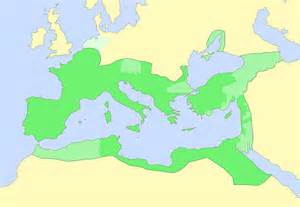Augustus: Rome's Powerful First Empire
Part 3: Emperor Ascendant Augustus recovered and returned to power. He gave up the consulship but retained his military command and control over most of the provinces. He remained overwhelmingly popular with the people at large, however, and they refused to elect two consuls in 22 B.C., preferring to leave one office open should Augustus want to retain that position. In 19 B.C., he was made consul for life. He continued to collect other political titles as well, assuming the responsibility of pontifex maximus when Lepidus died in 12 B.C. Ten years later, the transformation was complete as he came to be known as pater patriae "father of the country." Julius Caesar had held the same title when he was dictator for life.
It wasn't always Rome victorious, however, as illustrated most pointedly in the Battle of Teutoburg Forest, in A.D. 9, which resulted in the destruction of three entire legions and the end of Roman expansion into Germany. Augustus continued to expand Roman influence in-country as well, adding an official courier system to the network of roads he financed, creating police and fire services, creating the Praetorian Guard (the emperor's most trusted protectors), forming a stable standing army, ensuring that the city's aqueducts did not fall into disrepair, and even rebuilding much of the City of Rome, punctuated by prominent temples (including the Pantheon) and archways. In A.D. 4, he named his stepson Tiberius as his heir. Tiberius became Emperor in A.D. 14, when Augustus died. Augustus left a far-reaching legacy. One of his lasting achievements was nearly two centuries of peace, termed the Pax Romana. Another prime achievement was a wide-reaching reform of the tax system, by which more and more wealthy Romans were required to pay taxes to the Treasury. First page > The Early Years > Page 1, 2, 3
|
|
Social Studies for Kids
copyright 2002–2026
David White



 By this time, Augustus had overseen a string of military victories that had expanded the frontiers of Rome's influence: They had conquered or otherwise assumed control of all of what is now both Portugal and Spain; much of the Middle East, including Egypt, Syria, Parthia (finally), Galatia, and Judea; much of what is now Albania, Croatia, Hungary, and Serbia; much of what is now Austria, Slovenia, Switzerland, and southern Germany; and much of northern Africa.
By this time, Augustus had overseen a string of military victories that had expanded the frontiers of Rome's influence: They had conquered or otherwise assumed control of all of what is now both Portugal and Spain; much of the Middle East, including Egypt, Syria, Parthia (finally), Galatia, and Judea; much of what is now Albania, Croatia, Hungary, and Serbia; much of what is now Austria, Slovenia, Switzerland, and southern Germany; and much of northern Africa.

